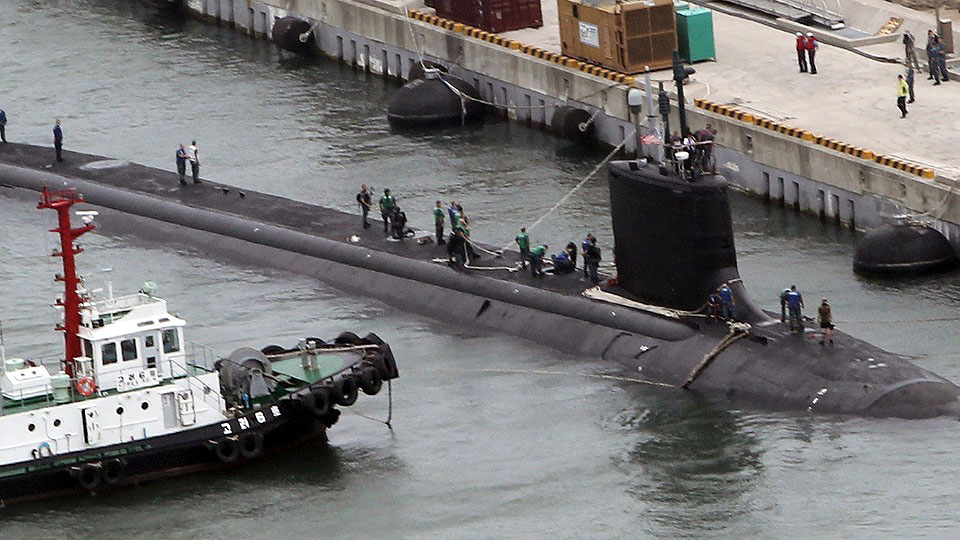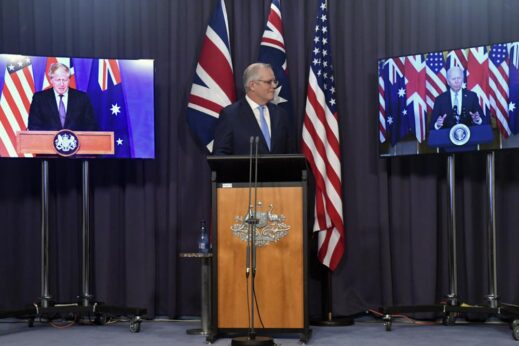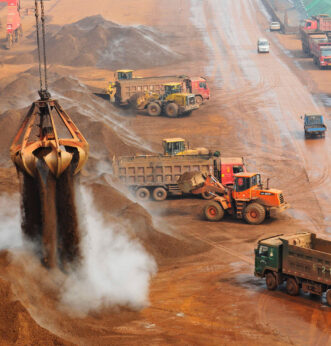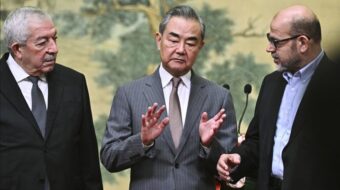
A new military alliance that will see the United States and Britain provide Australia with nuclear-powered submarines to patrol the Pacific and Indian Oceans is being denounced as a threat to “regional peace and stability” by China. The country sees itself as the obvious target of a U.S.- and British-supplied Australian atomic fleet.
Zhao Lijian, spokesperson for the Chinese Foreign Ministry, said Thursday that the pact between the three countries will set off an “intensifying arms race” in the Indo-Pacific region and severely damage global nuclear non-proliferation efforts.
The deal—dubbed AUKUS (Australia-U.K.-U.S.)—was announced in a joint news conference by U.S. President Joe Biden, British Prime Minister Boris Johnson, and Australian Prime Minister Scott Morrison early Thursday.
Biden pitched the agreement as an “historic step” to “address the current strategic environment in the region” and to protect what he called a “free and open Indo-Pacific.” Johnson called it “a new pillar” of strategy for Britain, which was long a colonial power in the region. Morrison said the building of eight nuclear-powered submarines with U.S. and British help will “deliver a safer and more secure region.”
The new Cold War
The deal comes amid the backdrop of a years-long military build-up by the U.S. that has been characterized by many analysts as the early stages of a new Cold War intended to constrain China’s growing economy and restrict its international influence.

None of the three leaders mentioned China during the event, but there is no denying that the submarine pact is aimed directly at the rising socialist power. Other figures associated with the governments involved admitted as much.
Tom Tugendhat, a Member of Parliament for Johnson’s Conservative Party, was direct and aggressive in tweets posted in the wake of the announcement: “The reason for all this is clear—China,” he wrote. “After years of bullying and trade hostility, and watching regional neighbours like the Philippines see encroachment into their waters, Australia didn’t have a choice. And nor did the US or UK.” Tugendhat is chair of the British Parliament’s Foreign Affairs Committee.
The head of a top military-focused think tank, Peter Jennings, at the Australian Strategic Policy Institute, told the Associated Press, “We should call the first submarine in this new category the ‘Xi Jinping,’” referring to the Chinese president. “No person is more responsible for Australia going down this track than the current leader of the Chinese Communist Party.”
Jennings’s anti-communist finger-pointing at Xi summarizes the general analysis that the submarine deal is receiving in much of the media. Recently strained relations between Canberra and Beijing are held up as the primary prod for Australia to make this move, with alleged Chinese expansionism in the South China Sea and aggressions toward Taiwan rounding out the supposed motivations.
Several nations make claims on islands in the South China Sea, including Vietnam, the Philippines, Malaysia, Brunei, and China, among others. None of the three parties to the new military alliance, however, have any claim or basis for naval activity in the area. Yet, in clear provocations aimed at China, the U.S. and U.K. have both been sailing military vessels there and conducted war games in the region, as well as in waters near Taiwan—which China regards as a breakaway province.
With its new nuclear submarines, Australia will no doubt be joining the patrols.
The U.S. has been eagerly courting Australia for some time, hoping to tear it away from its close economic ties with China. It also recruited the country into another military arrangement—the Quadrilateral Security Dialogue, or “Quad.” The latter includes India and Japan and is another anti-China quasi-alliance.
Mining profits at stake
By embarking upon a tighter military embrace with U.S. imperialism, Australia is taking a significant financial gamble. Despite recent trade disagreements with China, the country remains Australia’s largest trading partner, by far. As of early 2021, China took in nearly 40% of all Australian exports. The U.S., by contrast, bought only 11% of what Australia produces for the world market.

Mineral resources, particularly the iron ore needed to make steel, are Australia’s biggest export to China. Chinese economic growth and development have translated into a major boost in profits for Australian and international mining companies in recent years, and that has brought the Australian government a windfall in tax revenues.
But China’s cuts to steel production and its announcement of stricter climate control regulations that will hit big carbon emitters—like ore refineries and steel mills—have Australia’s mining giants worried they may need some new customers. Iron ore prices have plunged 45% from their previous peaks, largely due to Chinese policy changes, so Australian mining companies fear a pinch on their bottom lines.
Just hours before the AUKUS alliance was announced, the Organization for Economic Cooperation and Development (OECD)—one of the top institutions promoting capitalist and ‘free market’ ideology around the world—urged Australia to turn away from China.
In a report issued Wednesday, the OECD warned Australia that too much trade with China made the country “vulnerable.” It said that Australia “should explore the potential for trade diversion to other export markets” and “provide targeted support to the impacted industries.” Translation: Move away from trade with China and hand out cash to your mining companies while they look for new buyers.
NATO of the Pacific?
While think tanks fret over the stability of mining profits, others are worried about the geopolitical implications of the submarine pact. Einar Tangen, a political analyst based in Beijing, told Al Jazeera that the agreement has “echoes of gunboat diplomacy going back to the colonial era.”
All signs point to the sub deal—along with the Quad war games with Japan and India and the push for Australia to decrease its trade with China—as the beginning moves in a consolidation of a wider anti-China military and economic alliance. Helmed by U.S. imperialism, with former colonial master Britain as junior leader, the goal appears to be to lock in as many nations in the Asia-Indo-Pacific region as possible.
The effort has some resemblance to the U.S.’ effort to assemble the North Atlantic Treaty Organization (NATO) as an anti-communist military pact directed against the USSR in the late 1940s.
Sharing nuclear submarine technology with Australia is a significant move in that direction, as Britain is the only other nation the U.S. has ever provided with atomic propulsion know-how, and that was in the middle of the Cold War against the Soviet Union.
Boris Johnson indicated in his remarks at the AUKUS launch that the subs were only the first item on the alliance’s agenda. “We expect to accelerate the development of other advanced defense systems in cyber, artificial intelligence, quantum computing, and undersea capabilities,” he said.
U.S. and British officials appeared to take no notice of the hypocrisy of assisting Australia in the development of nuclear-powered vessels while they continuously push the importance of nuclear non-proliferation when it comes to countries like Iran and North Korea.
Meanwhile, one country in the South Pacific which explicitly refused to join the alliance was New Zealand. Since the 1980s, it has been a self-declared nuclear-free nation. Prime Minister Jacinda Ardern said New Zealand wasn’t invited to join the pact and would have said no anyway. It should “be very clear to all New Zealanders, and to Australia,” Ardern said, “why New Zealand would not wish to be a part of that project.”
France also spoke out vehemently against the deal, but not because it is opposed to military alliances or nuclear proliferation. The AUKUS deal sinks a previous agreement between France and Australia for a diesel-powered sub fleet, so France ended up in the position of being outflanked by another, bigger weapons dealer.
French Foreign Minister Jean-Yves Le Drian said, “It was a stab in the back” by Australia. As for Biden and the U.S., Le Drian remarked, “This brutal, unilateral, and unpredictable decision reminds me a lot of what Mr. Trump used to do.”
The alliance has homegrown critics as well. Former Australian Labor Party Prime Minister Paul Keating slammed the deal. He said that “materiel dependency on the United States robbed Australia of any freedom or choice.” In 2019, he accused Morrison’s government of letting “the phobias of security agencies” dominate Australia’s foreign policy and said that the “whispered word Communism of old is now being replaced with the word China.”
No price tag has been announced for the subs that will be built in Adelaide, but Morrison admits that Australia’s defense budget will be going up. The French submarine deal was worth $40 billion, and that was just for diesel-powered boats, so the new plan will no doubt feature a much higher figure.
And as with all previous military alliances and weapons deals, the people of the United States can expect to find themselves on the hook for a big portion of the costs as well.
RELATED ARTICLES:
China doesn’t want a new Cold War
U.S. pushes NATO to target China, risking new Cold War
New Zealand breaks ranks with ‘Five Eyes’ spy alliance over anti-China crusade












Comments